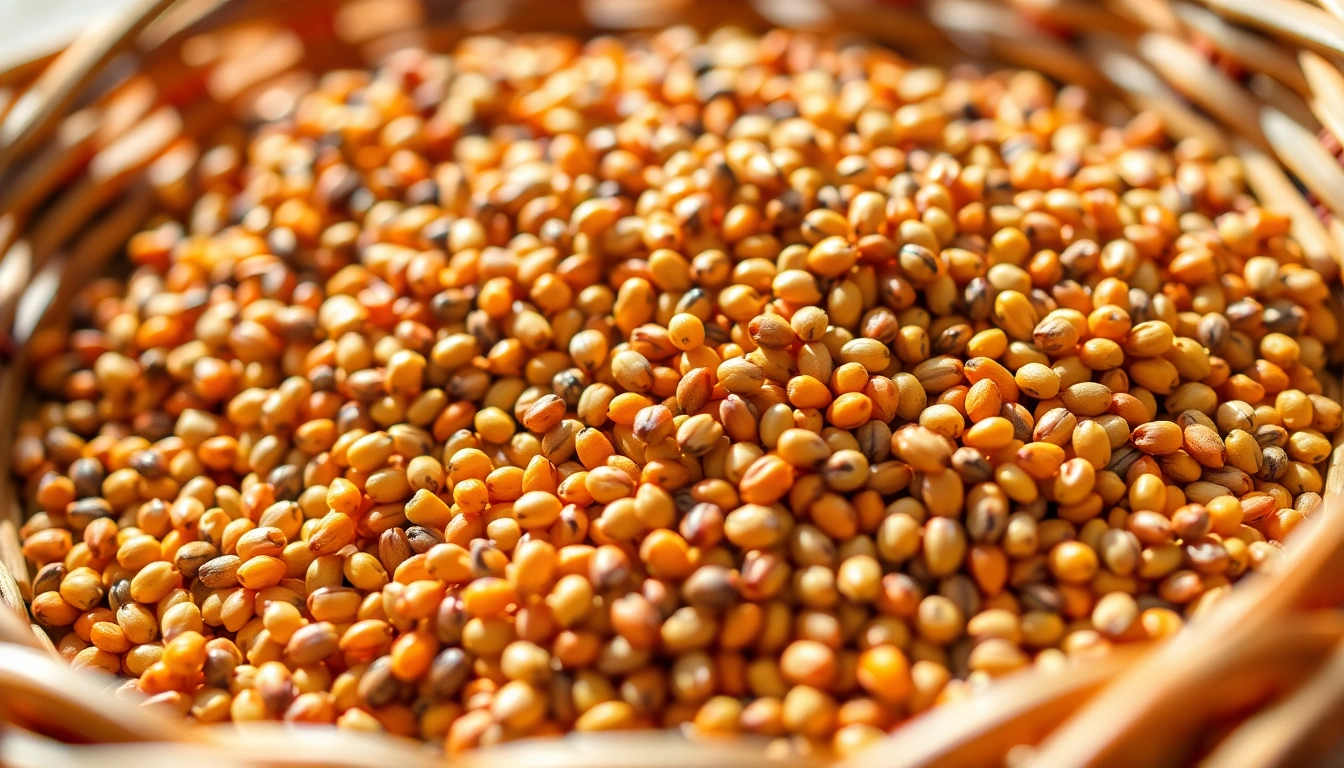Introduction to Niger Seeds and Their Market Importance
Niger seeds, also known as Nyjer or Thudha, are small, oval-shaped black seeds that hold significant value in both agricultural and nutritional sectors. Recognized for their rich oil content and numerous health benefits, Niger seeds have gained increasing popularity globally. Their high-quality production, especially when manufactured under stringent standards by reputable suppliers like Niger Seeds manufacturers, ensures premium products that meet international demands. With a growing consumer shift towards organic and superfood options, Niger seeds are becoming a staple in healthy diets and agricultural inputs alike.
Global Market Trends and Demand for Niger Seeds
The global demand for Niger seeds has seen a remarkable upward trajectory over recent years. This surge is driven by their versatile applications, including oil extraction, bird feeding, and as a health supplement. The organic food industry, particularly in North America, Europe, and Asia, emphasizes the purity and natural qualities of Niger seeds, prompting manufacturers to adopt high-quality standards. Moreover, their use in producing linseed oil, a healthy cooking oil, has boosted exports significantly. Countries with a strong focus on sustainable agriculture are particularly receptive, further propelling demand. Reports suggest that the global market size for Niger seeds is expected to grow at a compound annual growth rate (CAGR) of over 8% in the next five years, reflecting increasing consumption in processed foods and health supplements.
How Niger Seeds Benefit Agriculture and Health
In agriculture, Niger seeds are valued not only for their oil but also for their role in crop rotation and soil enrichment. Their ability to fix nutrients and improve soil fertility makes them a preferred choice among organic farmers. From a health perspective, Niger seed oil is rich in essential fatty acids, antioxidants, and vitamin E, contributing to cardiovascular health, skin vitality, and anti-inflammatory properties. Incorporating Niger seeds into daily diets—whether through direct consumption, cooking, or as a supplement—supports optimal nutrition. The seeds’ natural profile aligns with current consumer demands for organic, non-GMO, and preservative-free products, highlighting their significance in modern health and sustainable farming practices.
Manufacturing Process of Niger Seeds in Premium Quality Standards
Raw Material Selection and Quality Control
Ensuring premium-quality Niger seeds begins with meticulous raw material selection. Leading manufacturers focus on sourcing from certified organic farms to guarantee seed purity and free from contaminants. Advanced sorting and cleaning techniques remove impurities, broken seeds, and debris, thereby maintaining high standards. Raw material quality control processes include sensory evaluation, moisture content analysis, and pathogen testing, aligning with internationally accepted standards such as ISO and HACCP certification.
Processing and Packaging Techniques for Optimal Freshness
Post-harvest, Niger seeds undergo careful processing involving drying, dehulling if necessary, and graded storage. Modern processing plants utilize automated machinery to ensure uniformity and minimize oxidation. Packaging plays a pivotal role in preserving seed freshness. Vacuum-sealed, heat-resistant, and moisture-proof packaging solutions are employed, tailored to export and domestic markets. This approach not only extends shelf life but also retains the seeds’ nutritional value and flavor.
Certifications and Quality Assurance for Export
To meet global export standards, manufacturers obtain certifications such as ISO 22000, HACCP, Organic Certification, and Kosher certifications, ensuring product safety and quality. Regular audits, third-party testing, and traceability systems are integrated into the production cycle. These measures foster trust with international buyers, facilitate compliance with import regulations, and enhance market competitiveness.
Applications of Niger Seeds in Food and Oil Industries
Use in Cooking, Baking, and Traditional Recipes
Niger seeds are widely used in various culinary traditions, primarily as a flavor enhancer and nutritional boost. They are incorporated into bread, biscuits, and snack mixes, especially in regions where traditional diets emphasize natural ingredients. Toasted Niger seeds add a nutty aroma and texture to dishes, making them a popular addition in salads and confectionery. Their mild flavor profile allows seamless integration into diverse recipes, supporting health-conscious consumers seeking wholesome ingredients.
Extraction of Niger Seed Oil and Health Benefits
The oil extraction process involves cold pressing, which preserves the seeds’ nutritional integrity. Niger seed oil is rich in linoleic acid (omega-6), oleic acid (omega-9), and natural antioxidants, making it favorable for cardiovascular and skin health. It possesses anti-inflammatory properties and is ideal for cooking, salad dressings, and cosmetics. Premium expeller-pressed oils sourced from certified manufacturers ensure purity, free from chemicals and additives, aligning with the wellness trend and organic standards.
Incorporation in Nutritional Supplements and Superfoods
With the rise of superfoods, Niger seeds have gained popularity as a dietary supplement due to their nutrient density. They are available in powdered form, mixed with other superfoods, or as oil capsules. Incorporating Niger seeds into smoothies, protein bars, and health drinks provides essential fatty acids, promoting overall well-being. Their rich antioxidant content also supports immune health and cellular regeneration.
Exporting Niger Seeds: Logistics, Regulations, and Market Strategies
Key Export Markets and Customer Insights
Major export destinations include the United States, European Union nations, Middle Eastern countries, and Southeast Asia. Market analysis indicates that health food brands, organic supermarkets, and industrial oil producers are primary buyers. Understanding regional regulations regarding food safety, residue limits, and packaging standards is vital. Establishing strong relationships with local distributors and participating in international trade fairs, such as Biofach and Foodex, help expand market reach as demonstrated by Spice Nest’s successful participation at Biofach 2024.
Shipping, Documentation, and Compliance Standards
Efficient logistics are crucial for fresh and quality-preserved Niger seeds. Cold chain management, appropriate palletization, and customs compliance facilitate smooth export operations. Documentation includes phytosanitary certificates, Certificate of Origin, export permits, and quality compliance reports. Adhering to international standards ensures timely delivery and maintains product integrity upon arrival in overseas markets.
Building Customer Trust and Long-term Supply Agreements
Consistent quality, transparent communication, and reliable delivery build trust with international clients. Offering flexible packaging sizes, competitive pricing, and customized solutions foster long-term partnerships. Certified manufacturers with ISO and organic certifications are perceived as dependable, giving buyers confidence in product quality and safety.
Choosing the Right Niger Seed Manufacturer and Exporter
What to Look for in Quality Certification and Production Capacity
Prospective buyers should prioritize manufacturers holding internationally recognized certifications such as ISO, HACCP, Organic, and Kosher. Adequate production capacity, streamlined processing lines, and robust quality control systems indicate their ability to meet large orders consistently. Transparency in sourcing, processing, and testing processes further reflects commitment to quality.
Benefits of Local versus International Suppliers
Local suppliers like Spice Nest offer advantages such as better control over quality, quicker turnaround times, and localized expertise. They also facilitate face-to-face communication and rapid problem resolution. International suppliers may bring in advanced processing technologies and broader distribution networks but should be evaluated rigorously for compliance and reliability.
Case Studies of Successful Niger Seed Business Partnerships
Many enterprises have thrived through strategic partnerships with reputable manufacturers like Spice Nest, benefitting from consistent supply, quality assurance, and integrated logistics solutions. For example, collaborations with international organic food brands have successfully penetrated markets in Europe and North America by leveraging certification standards and sustainable sourcing practices.


